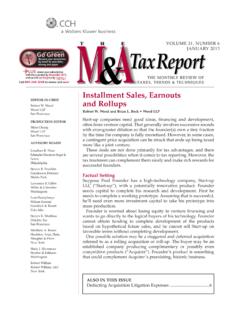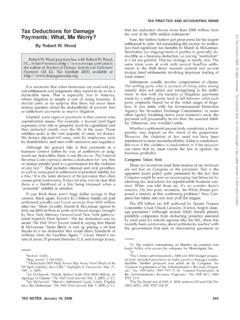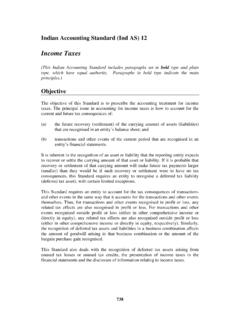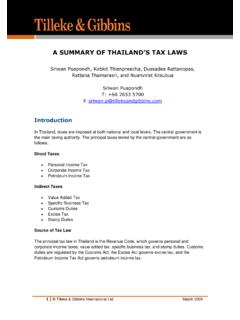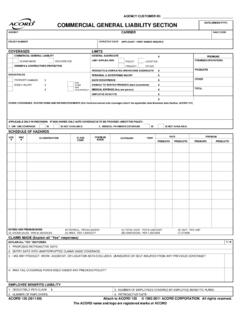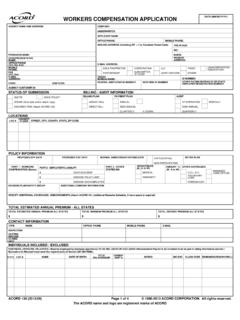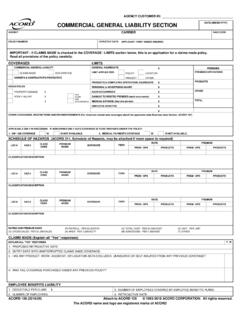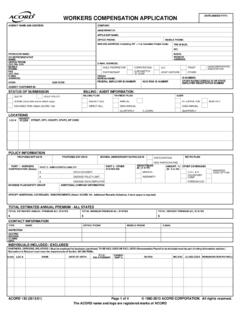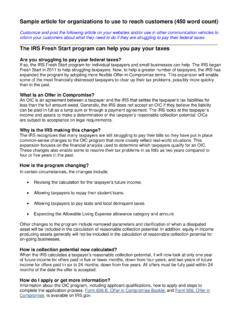Transcription of Some Fines and Penalties Are Deductible, And It Just Got ...
1 THE M&A TAX REPORT5 Some Fines and Penalties Are deductible , And It Just Got EasierBy Robert W. Wood Wood LLP San FranciscoAre Fines and Penalties tax deductible ? The Code says that no deduction can be taken for any fine or similar penalty paid to a government for the violation of any law. For this purpose, a fine includes civil Penalties as well as amounts paid in settlement of potential liability for any nondeductible fine or penalty. That may sound straightforward, but the regulations and case law make it less so. The regulations say that compensatory damages paid to a government do not constitute a fine or penalty. Moreover, only some Fines and Penalties are meant to punish. Other Fines and Penalties are really designed to be remedial, not penal.
2 Even if called a fine or penalty, they may be paid into a fund to be used for remediation. Such amounts are really more like damages or restitution, so they are allowable as deductions. In short, like so much else in the tax law, one cannot go by name tax advisers and businesspeople can be confused about these nuances, so too can lawyers and judges. That may help to explain the case of Fresenius Medical Care Holdings, Inc., decided by a District Court [Fresenius Medical Care Holdings, Inc., DC-Mass., 2013-1 ustc 50,323] and more recently on appeal by the First Circuit [Fresenius Med. Care Holdings, Inc., CA-1, 2014-2 ustc 50,416]. The case concerns the tax deductibility of amounts paid to the government to resolve a Federal False Claims Act (FCA) case. Fresenius is a terribly important case, not only in the First Circuit but beyond.
3 Defendants who are able to compromise with the government should be happy. But they should also get busy, for Fresenius suggests they can improve the odds that they can deduct their FCA allows the government to recover treble damages from those who make false claims against the United States. Treble damages tend to be viewed as punitive in nature, thus invoking the tax question regarding the deductibility of anything beyond compensatory is a provider of kidney dialysis. In 2000, Fresenius settled with the government and resolved claims for criminal and civil healthcare fraud. The agreement included a criminal fine of $101 million and a civil settlement of $385 million. The company made and deducted the civil settlement payments in 2000 and 2001.
4 The IRS disallowed 50 percent of the deduction as a nondeductible penalty. The IRS later allowed the company an additional deduction of approximately $69 million, which the settlement agreement labeled as relator fees to the claimed that there was no nondeductible penalty and sued for a refund. Fresenius asserted that the lump-sum settlement was only double the government s single damages, so it was all compensatory. that the undisputed evidence elicited at trial in this matter establishes that the United States is made completely whole in a False Claims Act case only by recovery of a damage amount in excess of the single or actual damage amount representing the repayment of claims alleged to be false or inaccurate.
5 Fresenius also submits that Supreme Court precedent makes clear that double damages are remedial in nature and the evidence elicited during trial in this matter establishes that the double damages were not punitive [Mot. for Summ. J., Aug. 15, 2012, ECF. No. 128].The Fresenius settlement agreement specifically stated: Nothing in this Agreement constitutes an agreement by the United States concerning the characterization of the amounts paid hereunder for [tax] purposes. The government argued that to deduct the payments, Fresenius had to prove the parties had actually agreed that the damages were compensatory at the time of settlement. However, the court asked the jury to decide whether Fresenius had established that the THE M&A TAX REPORT6civil settlement was not punitive.
6 The jury returned a verdict allowing Fresenius to deduct $95 million, still less than the $126 million the company had sought. IRS Guidance on Settlement DeductibilityThe IRS has become more sensitive to legal settlements, both on the income and deduction sides of the equation. In 2007, the IRS issued an industry director directive (IDD) on the deductibility of government settlements [see LMSB-04-0507-042, Doc 2007-13682, 2007 TNT 111-7]. In 2008, the IRS issued a coordinated issue paper (CIP) on the deductibility of FCA settlements [see LMSB-04-0908-045, Doc 2008-19051, 2008 TNT 174-54]. The CIP deals only with FCA settlements. The IDD covers FCA settlements with the Department of Justice (DOJ), as well as Environmental Protection Agency settlements for supplemental or beneficial environmental projects.
7 Yet the preamble to the IDD states that its principles can apply to any settlement between a governmental entity and defendant under any law by which a penalty can be assessed. The CIP concludes that a portion of a civil fraud settlement may be a penalty and thus nondeductible under Code Sec. 162(f). The ambiguity is mostly about intent, said the IRS, because the government may have a punitive or compensatory penalty. Historically, if the settlement agreement is not explicit, divining that intent is not easy. The burden of proof may decide the case. That is one lesson from one of the leading cases, Talley Industries, Inc. [68 TCM 1412, Dec. 50,285(M), TC Memo. 1994-608, rev d and remanded, CA-9, 97-1 ustc 50,486, 116 F3d 382]. There, a company and its executives were indicted for filing false claims with the government.
8 As a result of the company s actions, the Navy lost some $ million. However, Talley and the DOJ settled on a $ million figure. When Talley deducted the settlement, the IRS claimed it was a nondeductible fine or penalty. The Tax Court held that the settlement was indeed deductible , except for the $1,885 explicitly characterized as restitution. The size of the damages was relevant as a benchmark of what could be punitive. Noting that $ million was less than double $ million, the court inferred that the settlement was not intended to be penal or punitive. The IRS appealed, and the Ninth Circuit reversed and remanded, holding that Talley had failed to establish the compensatory nature of the settlement [see Talley Industries, Inc., CA-9, 2001-2 ustc 50,654, 18 FedAppx 661, Doc 2001-29836, 2001 TNT 232-6, aff g 77 TCM 2191, Dec.]
9 53,422(M), TC Memo. 1999-200]. Talley s entire deduction was Fresenius, additional authorities discussed included Bornstein [United States v. Bornstein, SCt, 423 US 303 (1976)] and Stevens [Vermont Agency of Natural Resources v. United States ex rel. Stevens, SCt, 529 US 765 (2000)]. These cases use a formulaic approach to treating the first third of FCA liability the single damages as direct compensation for the government s losses. The second third are categorically compensatory under Bornstein. The last third would be categorically punitive under Stevens. However, in Cook County v. United States ex rel. Chandler [SCt, 538 US 119 (2003)], the Supreme Court strayed from the categorical. The Court emphasized that the FCA s damages multiplier has compensatory traits along with the punitive.
10 After all, as recognized in Bornstein, some liability beyond the amount of the fraud is usually necessary to compensate the Government completely for the costs, delays, and inconveniences occasioned by fraudulent claims. Thus, the Court in Cook County refused to conclude that any portion of multiple damages under the FCA is necessarily remedial or punitive. Instead, the Court decried easy line-drawing and said that it all depends. Multiple damages can serve remedial purposes rather than purely punitive goals. The facts of the particular litigation must be UpIn Fresenius, the government argued that Talley meant the parties had to agree on the purpose of a settlement payment for it to be deductible . However, the district court ruled that an agreement is not necessary for payments to be nonpunitive.





